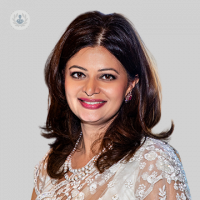Your fertility roadmap: Simplified glossary for clearer understanding
Written by:Trying to get pregnant? Confused by fertility terms and abbreviations? Looking for a simple fertility glossary to make things clearer?
Dr Anu Chawla, a fertility consultant, understands that fertility and IVF terminology can be confusing and wants to help you navigate the process with plain language. The goal is to guide you through assisted conception using easy-to-understand terms, so you can feel comfortable and confident in understanding every step of your fertility journey. Take a look at her simplified fertility glossary:

A
Adenomyosis: A condition where endometrial tissue infiltrates the uterine wall, leading to thickening and distortion of blood vessels. Adenomyosis is linked to fertility challenges.
Anti-mullerian hormone (AMH): A crucial sex hormone with roles that differ by sex and age. In fertility contexts, AMH predominantly pertains to a woman's ovarian reserve. Ovarian follicles produce AMH, aiding immature egg maintenance. Consequently, AMH levels gauge a woman's remaining egg count.
Assisted hatching: An additional step in certain IVF procedures, especially for previous IVF failures or older mothers. Embryos are enveloped by a shell-like layer known as the zona pellucida. To successfully implant in the uterus and initiate pregnancy, embryos must exit this shell. Assisted hatching involves experts facilitating embryo release by creating a small hole in the zona pellucida before transferring it to the uterus.
Asthenozoospermia: Refers to low sperm motility or sluggish sperm movement in males.
Antisperm antibodies: Occur when the immune system wrongly targets and attacks sperm in semen, posing a hindrance to conception. Both men and women can have antisperm antibodies, albeit rarely.
Azoospermia: Characterised by the absence of sperm in seminal fluid of males.
B
Blastocyst: A fertilised egg (embryo) that has matured for 5-7 days. During implantation, the blastocyst, a fluid-filled sphere, adheres to the uterine wall.
Blastocyst transfer: The introduction of a 5-day-old fertilised egg (blastocyst) into a woman's uterus, performed by a fertility specialist.
C
Clomiphene citrate: A medication stimulating egg follicle generation and ovulation in females.
Cryopreservation: Freezing sperm, eggs, or embryos for future use.
E
Endometriosis: Occurs when uterine lining tissue (endometrium) grows outside the uterus.
Egg collection: A pivotal IVF phase where hormone-stimulated eggs are retrieved from the woman's ovaries, usually under sedation or general anaesthesia.
Embryo transfer: After egg and sperm fertilization in the lab (in-vitro fertilization), fertility specialists implant embryos into the woman's uterus.
F
Follicle stimulating hormone (FSH): Crucial for menstrual cycles and fertility. FSH triggers growth of follicles, housing undeveloped eggs in ovaries. In men, FSH aids sperm production.
Follicles: Fluid-filled sacs in ovaries nurturing egg growth. Follicle loss/follicular loss: Reduction in a woman's egg reservoir due to aging.
Follicle tracking/follicular tracking: Ultrasound scans to predict ovulation timing.
Frozen embryo replacement/transfer (FER/FET): Thawed frozen fertilised eggs are placed in a woman's uterus.
G
Gametes: Sperm and eggs.
Gonadotropins: Hormones (like FSH and LH) governing reproductive functions essential for reproduction.
H
Human chorionic gonadotropin (HCG): A pregnancy hormone aiding progesterone production. Administered to women in fertility treatments to mature eggs before egg retrieval.
Hydrosalpinx: Accumulation of fluid in a blocked fallopian tube. Hypothalamus: A pivotal brain gland regulating hormonal shifts.
Hystero contrast sonography, aqua scan, or saline installation sonography (SIS): Ultrasound scan involving uterine cavity and fallopian tube evaluation using injected fluid.
Hysterosalpingogram (HSG): X-ray to assess womb and fallopian tubes.
Hysteroscopy: Inspection of the uterus interior using a slender instrument equipped with a light and camera (hysteroscope).
I
Implantation: Embedding of a fertilised egg (embryo) into uterine lining.
In-vitro fertilisation (IVF): Eggs extracted, fertilised with sperm in lab, then reintroduced into the womb for development.
ICSI (Intra-cytoplasmic sperm injection): When male partner's sperm issues exist, sperm is directly injected into egg for fertilisation, similar to IVF.
Intracytoplasmic morphologically-selected sperm injection (IMSI): Enhances ICSI by selecting high-quality sperm using powerful microscopy.
Intrauterine insemination (IUI): Quality-selected sperm introduced into woman's uterus during ovulation, aiding reproduction.
L
Laparoscopy: Minimally invasive surgery to examine uterus, ovaries, and fallopian tubes through small incisions using a camera.
Luteinising hormone (LH): Aids testosterone production in men and estrogen and progesterone in women, pivotal for ovarian function.
O
Oligozoospermia: Scarcity of sperm in semen.
Oligoasthenoteratozoospermia (OATS): Combo of low sperm count, low motility, and abnormal sperm shape.
Ovarian drilling: Procedure for PCOS by creating small holes in ovaries to reduce cysts and enhance chances of conception.
Ovarian hyperstimulation syndrome (OHSS): Ovary overreaction to fertility drugs causing swelling and pain.
Ovulation: Egg release from ovarian follicle. Ovulation induction: Use of fertility drugs to trigger release of mature eggs.
P
Percutaneous epididymal sperm aspiration (PESA): Sperm collection from epididymis using a needle, addressing sperm blockage issues.
PICSI (Physiological intracytoplasmic sperm injection): Similar to ICSI, sperm quality for fertilisation is determined using Hyaluronan.
Polycystic ovarian syndrome (PCOS): Hormonal disorder disrupting ovarian function and making conception challenging.
Pre-implantation genetic diagnosis (PGD): Lab analysis of embryo cells to identify genetic defects.
Pre-implantation genetic screening (PGS): Similar to PGD but assesses for potential genetic abnormalities.
Premature ovarian failure: Ovaries stop producing eggs before 40. Progesterone: Vital female hormone for menstrual cycles, pregnancy support, and womb preparation.
T
Teratozoospermia: Elevated abnormal sperm count. Testicular sperm aspiration (TESA): Sperm retrieval from testicles using a needle before IVF/ICSI.
Testicular sperm extraction (TeSE): Biopsy-based sperm extraction for men with no sperm in ejaculate, often for future IVF/ICSI.
This revised glossary aims to simplify intricate fertility terms, assisting you in navigating your fertility journey with clarity.
Dr Anu Chawla is a distinguished fertility specialist with over 15 years of experience. You can schedule an appointment with Dr Chawla on her Top Doctors profile.


